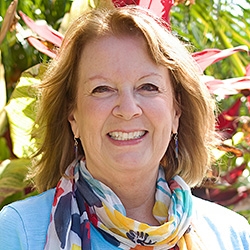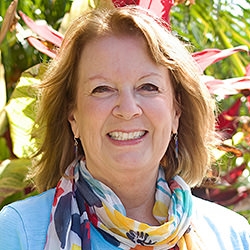

Search Results: responsibility
-
How do we talk to ourselves and with others about polarizing topics in a way that's supportive? Seek to understand and be understood rather than press for agreement. Bring mindfulness into the conversation. Slow down and use structure to support everyone. Release knowing the solutions, answers or outcomes. Keep focus on shared universal needs. From this place we can say what's in our hearts and minds, and trust the process.
-
- Understand the essential relationship between personal healing and social change — and how to communicate it to others.
- Increase your compassion capacity for different ways of being in the world.
- Get clarity about the difference between equity and equality — and how to generate equitable processes in your communities and networks.
- Obtain tools to explore the various factors that contribute to your understanding of power and privilege — including your own.
-
Trainer Tip: In an efficient group process, clarity is key. Try to only say things if you are clear what you want back from the group. Then ask for what you want so people don’t have to figure it out for you. If someone says something and you’re not sure what he wants back from the group, anyone can assist by saying this: “I’m confused about what you would like from us. Would you help us clarify what kind of a response you’re looking for?”
-
We only have this decade to make radical changes to avert crossing over into an unlivable Earth. What's essential is a critical mass of people with capacity to respond to many enormous, daunting social-environmental challenges. This means on a wider scale, responding to conflict, fear, hate, injustice and violence with the ability to see our commonality underlying our differences. And to feel part of a larger whole so we can birth natural caring, togetherness, and cooperation.
-
The American mythos of Independence Day is that liberty, equality, and opportunity are for all. Yet since the country's formation, these needs have been for some at the expense of others. It started with the brutal robbery and genocide of Native Americans and slavery of Africans. And this theme continued for generations in various forms, including how we related to other peoples, countries, and the ecosphere. To achieve true justice, liberty, and opportunity for all we may need to overcome the ego's sense of separation. Compassionate noncooperation may also be key.
-
Observation is the awareness of our sensory perceptions and thoughts, separate from evaluations and judgments. Feeling involves bodily sensations and emotions, distinct from "faux feelings" that mix thought and emotion. Needs encompass universal human requirements for survival and wellness, while thoughts and evaluations express needs. Requests are rooted in connection and invite true willingness, rather than demanding compliance.
-
In a workshop, a hesitant white neurodivergent man faced a triggering reaction from a Global Majority transgender man. Uncovering their backgrounds, the facilitator addressed family dynamics and exclusion. A repair exercise fostered empathy, challenging assumptions and emphasizing the importance of equitable facilitation for a richer group experience.
-
Read how an American Buddhist NVC teacher with Jewish roots reflects on how any dehumanization in the Israel-Hamas conflict can be used to justify all kinds of violence that can escalate for generations. With acknowledgment of the complexities, his desire is for us to bring in respect, dignity and peace -- for both Israelis and Palestinians. He emphasizes compassionate advocacy of all humanity amid the ongoing crisis.
-
It is the first day of 2024 and I am filled with gratitude and awe. Yesterday, I celebrated my 9th year of hosting my annual New Year’s Peace Meditation. We had over 800 people register from many, many different countries and the meditation was interpreted into 4 different languages. It was incredibly moving, connecting, and hopeful for me!
-
Observation is the awareness of our sensory perceptions and thoughts, separate from evaluations and judgments. Feeling involves bodily sensations and emotions, distinct from "faux feelings" that mix thought and emotion. Needs encompass universal human requirements for survival and wellness, while thoughts and evaluations express needs. Requests are rooted in connection and invite true willingness, rather than demanding compliance.
-
Oren Jay Sofer explains how we can stay grounded and maintain choice during overwhelming or emotionally charged conversations. He highlights the importance of presence—feeling our feet, noticing our breath, and expanding our awareness—to counter the fight-or-flight response and self-regulate. Oren also teaches a simple three-part structure for pausing a conversation without damaging the relationship: affirm the connection, state your limit, and offer a next step. By practicing and even memorizing a short version of this framework, we can exit challenging moments with clarity, care, and self-respect.
-
In this audio recording, Veteran CNVC Certified Trainer, Sylvia Haskvitz uses real-life situations to help us find more natural expressions of what is harmony with our hearts.
-
For each reactive pattern there is a perceived threat to a tender need. Knowing these tender needs helps us figure out how to interrupt these patterns and creating new ways of perceiving and relating to life. In addition to knowing the need, knowing the healing response and the primary reactive behavior helps with transformation.
-
To express opposition without stimulating distress, stop judging and look for ways to honor, understand, and have compassion for others. You can do this by finding a point of agreement. For example, you can agree with part of what they said. Or if you completely disagree, you can express what greater understanding, inspiration, appreciation or empathy you have in response to what they're saying. Read on for more on this, plus, ten sentence stems to get you started.
-
Use NVC to foster social change by navigating systemic issues with love and shared understanding.
-
Dear friends,
This morning, I woke up thinking about a poignant moment from a few years ago. My wife, Kim, and I were driving down a busy 4-lane road, and we were in a hurry to get somewhere important. Then we saw a mama duck with many small ducklings trying to get across the street. Kim pulled over, and we both hopped out to stop 4 lanes of traffic so Mama Duck could get across with all her ducklings. The last one had some kind of injury, so it took a very, very long time for all of them to make it across.
-
September says CHANGE to me and I love it! It’s a time to move away from summer and welcome in the fall – its changing colors, the changing light as the days become shorter. In this beautiful time of year, I start to notice an inner call for greater focus on the state of my life and work. Did you know that change has its own stages?
-
Dear Friends,
Have you ever found yourself in a situation where you could not see a good option, no matter how hard you looked? Or have you ever done something you felt ashamed or embarrassed about and struggled to release the shame?
Recently, I was telling a childhood story to some friends. It had us all laughing (a very welcome moment!), and it also got me reflecting about honesty and authenticity. Here’s the story:
-
Reducing overwhelm requires you to reconnect with your authentic choice, be present and compassionate with what's happening, heal trauma, and interrupt the trauma response. Read on for ways that may help you reconnect with your choice, presence and more on trauma.
-
Our world is facing stressful times. And the more stress you experience, the less resourced you can become. But consider that you're not messed up, but rather, the challenges you bear is a response to manufactured environments and culture that are more hostile than they are kind towards our human souls and bodies. And so, let’s be clear. Let’s be discerning. Let’s be compassionate. Let’s pay attention.
Quick Links

Stay in Touch!
We value your privacy, won't share your email address and you can easily unsubscribe any time.

















